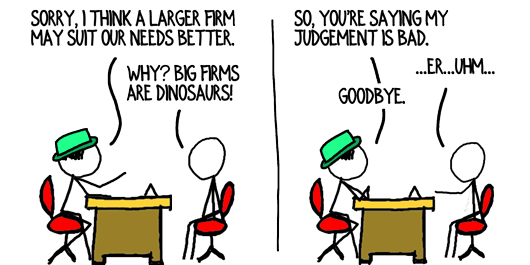You’re justifiably proud of your consulting firm. Your work is on par with the “big guys.” In fact, you do even better work than the big-name mega firms.
But, if we’re honest, we know that many of your prospective clients harbor legitimate concerns about working with a small consulting firm like yours.
Some advisors assure you that a few, clever words voiced with bravado will overcome your prospects’ objections.
Yeah. Doesn’t work in the real world.

Rather than trying to stampede over objections, make your consulting firm a more attractive, acceptable alternative to the consulting giants by addressing the eight issues outlined below.
Common Objections to Small Consulting Firms
(and Responses to Each)
Lack of Cachet
Professional lacrosse players are probably amazing at what they do. (Ducking?) But even the name “Major League Lacrosse” isn’t fooling anyone into thinking MLL is a big league sport.
The same goes for you. Not the ducking part. The part about you being amazing, but you still don’t have the prestige associated with “brand name” consultancies.
Response: Flaunt what you’ve got, stay Right-Side Up, and stop worrying about it. If you have some brand name pedigree or marquee clients, don’t be afraid to let those credentials drop in conversation.
Your real advantage, though, is being relentlessly client focused. If a prospect is determined to hire a recognizable brand name, the best thing you can do is shift your attention to better prospects quickly!
Questionable Consistency/Reliability
Chevrolet may not design the world’s sexiest cars, but consumers generally view Chevy’s cars as more reliable than, say, autos from Morgan. (It may not help that Morgan’s car frames are still built from wood.)
Similarly, your consulting firm strikes prospects as much riskier than a big-name alternative.
Response: Create proof points. Case studies, examples, and testimonials that demonstrate you’ve successfully completed many, similar consulting projects will dispel most of your prospects’ concerns.
Second-Rate Horsepower/Expertise
Big firms make a show of staffing with elite B-school graduates and extremely seasoned executives. Does that matter? You bet it does. Credentials bolster confidence.
Response: First, hire an outside expert to polish your consulting firm’s credentials to a fine luster. (You’re too biased and modest to do this well yourself.)
Then make your consulting firm’s credentials easy to find (but not the core) of your marketing, materials, and website. Whether or not your staff all hail from Oxford, don’t be shy about dressing up what you’ve got.

Missing Project Management Expertise
Prospective clients worry that your consulting firm lacks solid, project management skills.
Response: Your buttoned-up new business process should communicate, “We’re professional, organized and tightly managed.”
Your robust process (not the content) shows off your project management chops. That means pre-developed templates for key documents and rapid response times from start to finish.
Additional Response: If your consulting firm’s project management skills fall short, then outsource project management to an expert. It’s a minor expense and you’ll be amazed at what a trained professional can do for your efficiency and the quality of your output.
Limited Capacity and Footprint (Part 1)
Clients understandably question whether your consulting firm can pull off a massive, international project.
Response: If your prospect truly needs an army of boots around the globe, decline the project. Know what projects are not a good match for your firm. And don’t pretend that a loose affiliation of international colleagues works as well as a truly international firm. It doesn’t.
Limited Capacity and Footprint (Part 2)
Even on smaller projects, your prospects worry that your consulting firm’s capacity may be insufficient. Can you really take on their project? What if you land another client too?
Response: Reassure your clients by knocking their socks off with responsiveness and by never missing a deadline. Ever.
Weak Processes/Lack of Training
Big firms devote oodles of resources into their processes and training. Compared to that level of investment, your consulting firm can look Mickey Mouse.
Response: Ensure your consulting firm’s approaches are robust and as solid as a granite birthday cake.* It takes work, but you didn’t get into this business to goof off, right?
Read widely, stay open to other consulting firm’s approaches, and constantly improve at your craft.
Additional Response: Reframe; i.e., substitute an exciting, new perspective for your prospect’s traditional approach. Of course, to reframe effectively, you must master innovative models and solutions.

Difficult to Manage
The same personality traits that inspired you to lead a consulting firm can make you appear more challenging to partner with than traditional employees of a larger firm.
Response: Make your consulting firm easy to do business with. Every part of your client experience, from pursuit through post-project follow up can underscore how delightful it is to work with your consulting firm.
Limited Capabilities
One-stop shopping is easier and less stressful than tapping multiple providers. That’s true for computer software, for Argentinian pancake ingredients, and for consulting firms too.
Hence, prospective clients prefer one, big consulting firm that can (sorta) do everything and respond easily to shifts in scope.
Response: Push back on your prospect’s inclination to prioritize “easy” over “best.” Generalist consulting firms are not great at everything and they’re biased toward their own capabilities. Also, if a project calls for skills outside your core, consider subcontracting to fill the gap.
What other responses have you used to assuage prospects’ concerns about your consulting firm being too small?
Text and images are © 2024 David A. Fields, all rights reserved.

 David A. Fields Consulting Group
David A. Fields Consulting Group 

I prefer to shift the discussion from “firm” to people. Companies don’t build buildings, people do. Businesses don’t solve problems, people do. Consulting firms don’t create innovative solutions, people do. Focus the conversation – do we have the right people (and then the right approach) to create and implement solutions that fit your situation? And it’s nice to remember that people making buying decisions, not firms. As always love your column David, a fun read and a positive way to start the work day! all the best to you, MaryKate
You make an excellent point, MaryKate. If a client hires BigName consulting firm, they don’t actually have 10,000 consultants working on their project. (Though it may feel like that sometimes.) A small team works the project, just like your firm’s small team.
Many client concerns are still in force, though, because smart people using a world-class process will outperform smart people using a second-rate process. Hence, even as you focus the conversation on people, it helps to be able to reassure your clients on the non-people aspects of your consulting practice.
I’m so glad you chimed in with your experience, MaryKate. Super valuable.
Building on Mary Kate’s point, if you’re a REALLY small firm (of just one person) clients are typically buying your specific expertise in a particular area.
But when I was a BigCo partner/VP, clients couldn’t buy my expertise without ALSO paying for a ‘team’ to come in with me.
So even if my rates remain the same, I’m now the same expert but offering significantly greater value for money.
You’re right, Alan, that when clients hire boutique or solo firms (the first time), it’s often because of the deep, specialized knowledge and expertise. (Which, by the way, is why a tightly focused Fishing Line is so important.)
And, while not having to pay for a big team can make you better “value for money,” I’d encourage you to focus on just the value part of that statement and leave off the “for money” part. Also, consider dropping the whole notion of rates. The more you keep the focus squarely on value, the more value you can provide for your clients while also creating a more lucrative practice.
Thanks for adding your voice and excellent thoughts to the conversation, Alan.
Thanks for responding, David. Totally agree with focusing on the value part. The challenge, of course, is to offer something sufficiently differentiated to avoid the response, “Yes, I do see the value you offer. But I can get the same value from X at lower cost”.
Alan, at that point the differentiation is all built on Trust and Like. Who does the client believe is more likely to deliver the outcome without causing harm (2 points of the trust triangle) and who will be an enjoyable working partner?
Sometimes the best answer is to join them, not fight them. There are projects that are sometimes bigger or broader than we can handle as a small firm with a specialized consulting focus. Or the big firm already has the relationship. In some of those cases, our specialized skill set compliments what the big firm can bring to the table. They can’t always afford to have someone who knows the difference between every type of chocolate because the market isn’t large enough for them, but it works just fine for us. We can bring our detailed knowledge of the difference between 60% and 65% dark chocolate to solve a customer satisfaction problem while leaving the milk chocolate category to the big guys.
That’s a really great point, Derek, and one I hadn’t mentioned at all. You’re absolutely right: in many cases you can join forces with another firm–even a large firm to produce the best possible outcome for the client. Also, large firms can be excellent partners who send your business your way if you create strong, positive relationships with the right people.
Thank you for adding a terrific insight to this thread, Derek!
Some of us devote a portion of our practice to serving as subcontractors to large name-brand firms. It may be worth pointing out that the big guys use us to improve their capabilities in specialized areas. Subject to confidentiality restrictions, this indirect endorsement can be powerful.
Don, what you’re pointing out dovetails nicely with Derek’s point, below. Collaborating with large consulting firms can be to your advantage and can bolster your creds. Thanks for highlighting that!
Though I be but little, I am fierce. (Borrowed from W.S.)
You go, Hermia!…er… Elaine! Bonus points for bringing in The Bard.